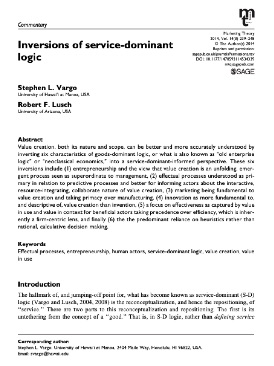Paper
Inversions of service-dominant logic
Vargo, S., Lush, R. (2014)
Marketing Theory, Vol. 14; Issue 3; pp239–248
DOI: 10.1177/1470593114534339Value creation, both its nature and scope, can be better and more accurately understood by inverting six characteristics of goods-dominant logic, or what is also known as ‘‘old enterprise logic’’ or ‘‘neoclassical economics,’’ into a service-dominant-informed perspective. These six inversions include (1) entrepreneurship and the view that value creation is an unfolding, emer- gent process seen as superordinate to management, (2) effectual processes understood as pri- mary in relation to predictive processes and better for informing actors about the interactive, resource-integrating, collaborate nature of value creation, (3) marketing being fundamental to value creation and taking primacy over manufacturing, (4) innovation as more fundamental to, and descriptive of, value creation than invention, (5) a focus on effectiveness as captured by value in use and value in context for beneficial actors taking precedence over efficiency, which is inher- ently a firm-centric lens, and finally (6) the the predominant reliance on heuristics rather than rational, calculative decision making.
Looks at various inversions that taking a service-dominant logic perspective has compared to the goods-dominant logic (which the authors also call ‘‘old enterprise logic’’ or ‘‘neoclassical economics”. These are:
- “entrepreneurship and the view that value creation is an unfolding, emergent process seen as superordinate to management,
- effectual processes understood as primary in relation to predictive processes and better for informing actors about the interactive,resource-integrating, collaborate nature of value creation
- marketing being fundamental to value creation and taking primacy over manufacturing,
- innovation as more fundamental to, and descriptive of, value creation than invention,
- a focus on effectiveness as captured by value in use and value in context for beneficial actors taking precedence over efficiency, which is inherently a firm-centric lens, and finally
- the predominant reliance on heuristics rather than rational, calculative decision making”

